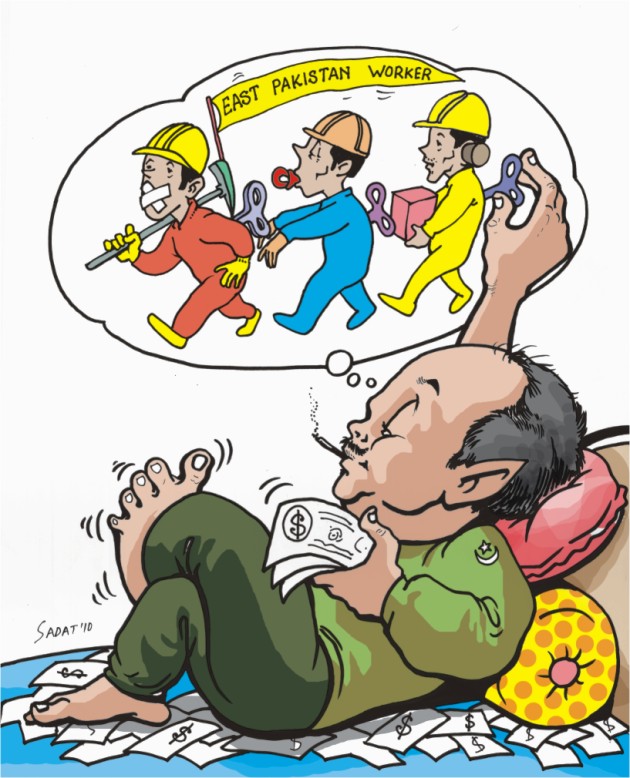
Inside
|
FORUM ARCHIVES Containing the Worker SIRAJUL HOSSAIN KHAN D R A M Malek, Labour Minister, Government of Pakistan, is reported to have said at Chittagong recently that the workers should not dabble in politics, and should concentrate only on improving their working and service conditions. He firmly maintained that politics must not be allowed to enter the domain of the trade union and working class movement. For the working class of Pakistan, particularly of East Pakistan, this theme to isolate trade unionism is too old to be considered afresh. It is, needless to say, through their participation in a number of political movements even during Ayub's dictatorial regime that workers of our country have demonstrated, beyond any iota of doubt, that they are very active in politics, and that they are going to lead and dominate our politics. One, therefore, wonders what made Dr Malek and members of his school harp on that old and rejected tune. It is also interesting to note that during last winter's mass upheaval, the veteran trade unionist, Dr Malek categorically stated more than once that until and unless the working class could establish its rule, none of their problems would be resolved. Certainly, the working class cannot rule without doing politics, Dr Malek was also categorical on this aspect of the question. However, this phenomena of changing one's tune is not new in this subcontinent. The efforts to contain trade union activities within the bounds of 'economism' have been going on since the very first day of its inception in pre-Independence India after the First World War (1914-18). Before World War I hardly any trade unions existed in India. The oldest workers' organisation that can be traced back is the Mill Hands Association of Bombay which was not a trade union in the true sense of the term. According to the memorandum submitted to the Royal Commission on Labour in 1892, this Association was in its infancy then and "the men have still such an inherited dread of, and respect for, their employers that the combination is at present weak". The trade union movement emerged in India in the wake of the difficult economic conditions created by World War I and the country witnessed a wave of strikes in 1920 and 1921 when the workers developed a sense of class consciousness. Simultaneously, the working class started participating in the freedom movement of India, and developing as a political force. But working class politics could not grow for two reasons: first, there was no political party of workers in the country at that time; second, the Indian National Congress at the instance of capitalist, feudal and imperialist interests took all precautions against the growth of working class politics. The reactionary forces adopted the tactic of posting their politicians in trade unions who tried to starve the trade union movement politically by projecting attention only on economic demands and concessions. They refused to analyse capitalism's contribution to the growth of economic ills. Instead, they took all care to ensure that the workers should not be able to make any political diagnosis of economic maladies. And, working along these lines, reformist leaders like Joshi, Chamanlal, Shib Rao, Giri and others came to the forefront of the Indian trade union movement. Dr Malek and his associates belonged to this school of thought in India, and it seems they are still trying to continue that legacy. It may, however, be noted that they definitely do dabble in politics -- the politics of resisting working class politics which the vested interests are most afraid of. This is, no doubt, impolitic. In Pakistan this line of trade unionism could make some headway with Government backing up to 1963-64 when its steep decline began with the corresponding rise in the impact of the scientific school of thought which projects the trade union movement as a concrete form of working class politics. The voice of 'economism' (which aims at keeping politics away from the arena of trade unions) has become very feeble and is dying its natural death. But the reformists are by no means inactive. They are trying to change their tactics -- they now express themselves in favour of workers doing politics in order to draw the working class into the fold of bourgeois politics and keep it away from revolutionary politics. Of late, this latter pattern of reactionary trade unionism has become noticeable. On this account, some new organisations have been floated, and the old known ones are trying to present themselves as protagonists of the political rule of the working class. Workers should make no mistake, even if the 'wolf' has changed its skin.
|
